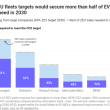ANZ Bank, fund manager Nuveen, and Australia’s Department of Finance and Trade (DFAT) are supporting Indonesia’s initiative to raise $1.5 billion in gender-focused capital by next year through Orange Bonds. The three companies are a part of a steering committee backing Indonesia’s efforts.
This move was agreed upon during a roundtable discussion on Indonesia’s Sustainable Development Goals (SDGs) last month, which also included several Indonesian government agencies, the Impact Investment Exchange (IIX), and the Ford Foundation.
The proposed Orange Bonds aim to support women-led micro, small, and medium enterprises, which play a significant role in Indonesia’s economy, contributing 61% to the GDP and 97% of local employment.
Dr. Vivi Yulaswati, chair of the national SDGs implementation team, highlighted Indonesia’s commitment to becoming a developed nation by 2045 through innovative financing like the SDG Bond introduced in 2021.
“The Orange Bond not only offers innovative financing solutions but also promotes social and economic inclusion by providing greater financial access for women and vulnerable groups,” she said in a press statement.
To garner community support, a feasibility study for the Orange Bonds has been launched. Before this, Indonesian investors could only purchase Green Bonds, Green Sukuk, and SDG Bonds. The Orange Movement, established in 2022, aims to raise $15 billion in Orange Bonds by 2030 to empower 100 million women and girls globally.
“Gender equality is key to achieving sustainability. This coalition will push forward an initiative we know will benefit economies around the world,” said Stephen Liberatore, head of public markets ESG/Impact fixed income investment team at Nuveen.
The bond, which offers a 3.4% fixed rate coupon with a three-year maturity.
“The size of the bond is considerably small for a sovereign or even a bond in general compared to those issued in the market,” said Xuan Sheng Ou Yong, sustainable fixed income lead, Asia Pacific, at BNP Paribas Asset Management.
He explained that the bond’s small size is justified as it might be challenging for a sovereign to allocate sufficient gender-related expenditures over three years of budgets. He also noted that a 3.4% coupon rate is reasonably priced when compared to the rates of other A+ to A- rated European sovereign bonds for the same duration, with Bloomberg data indicating a range of 3.2% to 3.4%. In contrast, the Women’s Livelihood Bond™ 6 (WLB6), an orange bond released late last year, offers a higher coupon rate of 7.25%.














